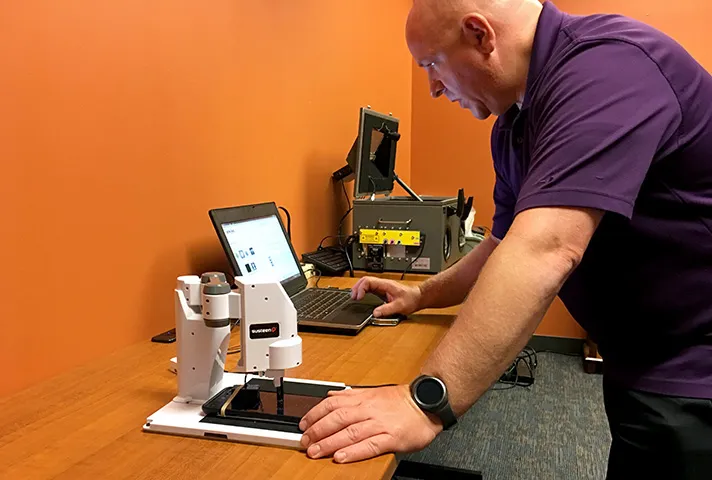
Senior Probation Officer Steve Holmes programs a robotic arm to try to crack a passcode on a locked mobile device at the Eastern District of Missouri's National Forensic Laboratory.
A robotic arm gestures across a tablet screen, using sophisticated software to try to crack a geometric passcode. Drones and flash drives lie dissected on a workbench, while a state-of-the-art computer scans a hard drive. This isn’t the CSI Crime Lab, it’s the Eastern District of Missouri’s National Forensic Laboratory.
The lab at the Thomas F. Eagleton U.S. Courthouse in St. Louis is the Judiciary’s first national computer forensics facility, a novel venture that is helping federal probation and pretrial officers compete with increasingly tech savvy offenders. It’s also saving time and money. Courts across the country can use the lab’s services in lieu of setting up their own, and they can get faster results than they had been getting using outside law enforcement agencies.
“Officers need access to advanced and timely computer forensics services to stay one step ahead of individuals using technology to violate terms of supervision,” said Senior Probation Officer Steve Holmes, the lab’s forensics guru.
While some federal court districts already have their own in-house labs, the creation of a national facility helps districts avoid lengthy wait times for forensic services provided by local law enforcement agencies and FBI offices. It can take months to get results from outside agencies, while the lab in St. Louis averages a turnaround time of two weeks. The time savings can be critical when officers need to examine the contents of seized devices from people suspected of violating their supervision terms.
“It gives officers the opportunity to identify setbacks in an individual’s supervision before they become larger issues that endanger the public’s safety or derail the treatment process,” said Ken Fitzgerald, deputy chief probation officer in St. Louis.
The cost savings is also a major plus for federal probation and pretrial offices across the country.
“A forensic lab is a costly undertaking that most districts simply don’t have the space or resources for, making a shared-service approach the best option,” said Michelle Spidell, a probation administrator for the Administrative Office of the U.S. Courts, who assisted in the creation of the lab. “Just the equipment alone can cost upwards of $100,000, not including the cost of staffing and training.”
Since opening in October 2017, the lab has provided services to 25 of the 94 federal court districts and has examined over 250 devices. Partnering districts pay only postage for the services. The facility and its three-person staff are equipped with six work stations, an electronic evidence-collection tracking system, and more than 25 hardware and software tools to examine everything from mobile devices to gaming consoles. The lab has inspected devices for a variety of cases, including those involving child pornography, fraud, and terrorism.
Holmes brings to the job more than 17 years of IT and probation experience and over 500 hours of specialized forensic training. He spends his days working four cases at a time, examining as many as 22 devices a day, all while keeping an open line of communication with officers who have submitted materials.
Rundell Lewis, a senior probation officer in Chicago, and Henry Serna, a supervisory probation officer in Cleveland, say the lab’s services have been invaluable in their work.
“As an officer, it’s my job to protect the community, and timely reports from the lab ensure that the court is well-informed before deciding on whether to detain or closely monitor an individual while continuing an investigation,” Lewis said.
Serna recalled that the lab was able to quickly gain access to a sex offender’s seized phone, helping him discover communications with young girls across several messaging applications.
“Thanks to the national lab, we were able to stop the offender in his tracks,” Serna said. “St. Louis’ advanced services and dedicated forensic specialists give us the leverage we need to keep supervised individuals on the right track and prevent them from causing harm to the public that we’ve sworn to protect.”
Subscribe to News Updates
Subscribe to be notified when the news section is updated.
